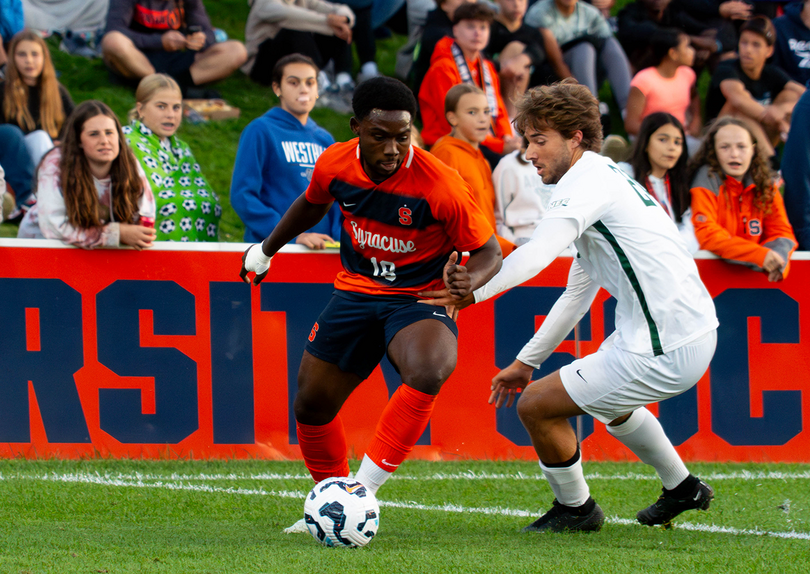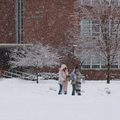Upstate United coaching gig reconnected Michael Acquah to Ghanaian origins

Michael Acquah left Ghana in 2023 to pursue college soccer in the U.S. He repaid his community by coaching West African kids at Upstate United last spring. Jacob Halsema | Staff Photographer
Get the latest Syracuse news delivered right to your inbox. Subscribe to our sports newsletter here.
There was only one thing on Michael Acquah’s mind after his plane touched down in the United States. The forward was officially meeting his new head coach Sicelo Buthelezi for the first time.
But at that moment, he couldn’t have cared less about soccer.
“Coach, how’s the food?” Buthelezi recounted Acquah asking.
Acquah, a native of Awutu Bereku, Ghana, decided to move over 5,000 miles to Lindsey Wilson University, an NAIA school in Kentucky with fewer than 4,000 students, to play college soccer in 2023. It was his first time leaving his home country.
Buthelezi understood it’d take time for Acquah to adjust to the U.S. So, he covered his bases. After picking Acquah up from the airport, Buthelezi took his new recruit to a Senegalese restaurant down the road. Acquah gorged himself on lamb and jollof rice — staples of Ghanaian, and West African, cuisine.
“Whenever there’s a new guy that arrives, I try to make them as comfortable as possible,” Buthelezi said. “The minute he asked me that, I was like, ‘There’s a place that’s got some African food.’”
Acquah’s only continued to acclimate himself since then. After one season at Lindsey Wilson, he transferred to Syracuse in an effort to elevate his game. He’s done just that. The junior forward led the Orange with six assists last season and remains one of their top strikers this year.
But Acquah’s made a bigger mark off the pitch. For 13 weeks last spring, he volunteered as a coach with Upstate United Football Club, a primarily-Liberian United Premier Soccer League team in Syracuse. While teaching players ranging from 5 to over 20 years old, he gave back to both the Syracuse and West African communities that shaped his career.
“I was just thinking to myself, ‘Wow, I’m also on this level,’” Acquah said of the experience. “I like to play soccer, but I didn’t know that I would get to that point.”

Sophia Burke | Digital Design Director
Yet that wasn’t the original plan. Upstate United president Hanson Goeso first tried to recruit Acquah as a player. Although Acquah couldn’t play, he still wanted to help out.
That’s when Goeso offered him a coaching gig. He told Acquah that it’d be much easier for a college athlete like him to teach the players.
“Once (Goeso) told me about him, I was really excited,” UUFC administrator Abu Bility said. “I was saying anything we can do to get him on board, because the goal was to get other African kids in this community to see him coaching.”
Acquah agreed, officially joining the team last January. He resonated with Bility’s message, striving to help open doors for young kids.
He started by coaching children ranging from 5-12 years old three days per week. Acquah eventually worked his way up to Upstate United’s academy and first team, where he worked with high school and collegiate players.
Though he was originally overwhelmed at his second-ever coaching job, Acquah took time before each session to jot down areas he wanted to focus on. They included general fundamentals, footwork and passing, among other skills.
Goeso mentioned ball handling is one of the biggest challenges young players face. Some didn’t know how to kick properly. But across 13 weeks with Acquah, Goeso saw noticeable progression.
Through his coaching, Acquah also incorporated elements of his own game. Beal described it as an “African coaching style,” as he explained one-touch passing — a common West African tactic — by running a drill that had players touch a pass and then sprint to receive another. He also taught them how to trap the ball and stop and turn on a dime.
Acquah wasn’t trying to mold his players into versions of himself. He merely infused his best qualities into their games to round them out.
“Sometimes we didn’t have the best equipment, we didn’t have the best places we were playing, so it was difficult,” Beal said. “But he was one of the people who made it worthwhile for the kids.”

Michael Acquah shields off UConn defender Ayoub Lajhar in Syracuse’s matchup with the Huskies on Aug. 21. Despite not recording one yet this season, Acquah totaled 15 goal contributions across his first two years of collegiate soccer. Joe Zhao | Senior Staff Photographer
Their shared West African heritage was also a bonus. But that didn’t stop Acquah from some friendly banter.
Bility said Acquah argued with the kids about whether Liberia or Ghana had the best jollof rice. They’d even discuss their favorite Premier League teams; Acquah — as well as many other West Africans — is a Chelsea fan. Many viewed him as a big brother instead of their coach.
He even bonded with UUFC chairman Richard Beal, who’d previously served with the Peace Corps in Africa. Beal had been coached by Ghanaian soccer legend Frank Odoi, who many Ghanaians hold in similar regard to NBA Hall of Famer Michael Jordan.
“It’s not just because we’re all coming from the same story. We’re all coming from war-torn or politically corrupt backgrounds, and we’re coming for better lives,” Goeso said. “When we see each other, I think it just gives us that bond.”
Those relationships made coaching even smoother. But the experience was only possible because of his move to the U.S.
Initially, he struggled. Food. Transportation. Weather. Everything was foreign.
In his first few weeks at Lindsey Wilson, Acquah often called his mother for hours to help him cook meals and ease the pressure he felt. He also mentioned Ghana has two seasons — rainy and dry — which made the extreme hot and cold temperatures in Kentucky seem strange. He couldn’t even hitch a cab for rides because Lindsey Wilson was in “the middle of nowhere,” so he avoided going anywhere he wasn’t explicitly told to.
“It’s something that’s a big step for me,” Acquah said. “In Ghana, going to academies, I was living at home. But this was a bit different. I didn’t know what’s going to happen.”
After a few weeks, Acquah began living with a host family when his roommate, Kenn Muendo, realized he was being left out. Muendo, a Kenyan native, and Buthelezi both noticed Acquah made friends with both other international players on the team and students outside of the program, which helped him feel at home.
It's not just because we're all coming from the same story. We're all coming from war-torn or politically corrupt backgrounds, and we're coming for better lives. When we see each other, I think it just gives us that bond.Hanson Goeso, Upstate United president
On the field, nothing changed. Acquah finished with seven goals and one assist as a freshman.
He initially thought he’d stay at Lindsey Wilson for another year. Acquah didn’t even know the difference between Division I, II and III athletics when he arrived in the States.
Though when he caught wind from a former coach in Ghana that Syracuse was interested in him, he began to think. If he wanted to play professionally, why not take a step up to D-I? He was already familiar with Nathan Opoku, a close friend and former Lindsey Wilson striker who made a successful move to SU two years prior.
So, after Buthelezi allowed Acquah to speak with Orange head coach Ian McIntyre and his staff, they gave him all the affirmations he needed to hear, emphasizing the role he’d play in their offense.
Three days later, Acquah chose Syracuse. The decision has only paid dividends.
Contrary to his role at Lindsey Wilson, he settled in as SU’s top distributor despite limited scoring opportunities.
“He’s powerful, he’s direct,” McIntyre said on Wednesday. “When he’s playing, he’s playing with a big smile on his face. He’s been a real handful for the opponent.”
This season, though, he’ll have an extra boost due to his gig with Upstate United. Acquah said he’s taken his players’ shortcomings into account when molding his own game, a mindset that can help him improve even more.
More notably, he’ll have a new backing behind him at SU Soccer Stadium.
A new contingent will be present, one specifically for Acquah. A group from Upstate United will be at nearly every home game, cheering Acquah on and donning his jersey so he realizes his hard work didn’t go unnoticed.
“He’s gonna see the difference this year,” Bility said. “We’re going to be chanting his name, just making sure that he knows that we are there to support him, the same way he supported our community.”





